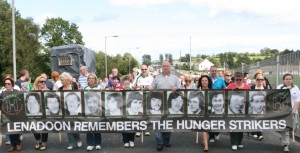8 November 2011
H-Blocks Hunger Strike transformed struggle – Leo Green & Rose Dugdale
MARKING THE END OF THE 1981 HUNGER STRIKE | LEO GREEN AND ROSE DUGDALE
H-Blocks Hunger Strike transformed the struggle
BY IAN McBRIDE
THE END of the H-Block Hunger Strike on October 3rd 1981 was marked in Dublin on October 3rd 2011 by the Dublin South Central ’81 Commemorations Committee in the Ballyfermot Civic Centre with guest speakers former H-Blocks Hunger Striker Leo Green and Rose Dugdale, well-known Dublin activist and former POW, with her personal view.
Leo Green said that all commemorative events, large or small, are important.
They are about paying tribute to all those who took part in the prison struggle, the hundreds of prisoners in the H-Blocks and Armagh Prison, their families and the hundreds of thousands who leant their voice or energy at one point or other during that period, in Ireland or abroad, in support of the prisoners’ demands. And they are a particular tribute to the ten comrades who lost their lives on hunger strike and their families. Their sacrifice has been enormous.
Commemorations are often sad occasions but when we think back to 1981 we have much to be proud of and, despite the great loss and suffering of the time, when we think of the consequent political developments since, we have much to look forward to and be hopeful for.
Recalling the statement by the prisoners announcing the end of the Hunger Strike on October 3rd 1981, Leo said:
The Hunger Strikers, with their very lives, had lit an eternal beacon which would inspire the Irish nation
With every year that passes, with every commemoration, with every political development, that beacon gets that much brighter. The Hunger Strike was indeed a watershed moment. It transformed struggle, it transformed politics, it generated new thinking, and the republican project is much further advanced as a direct result.
Building a brave new world
BY ROSE DUGDALE
THE huge events which we have all lived through over the past 30years pose a fundamental question: where else in the world have the very men and women who fought the war taken part in the subsequent transition to power? The H-Block men and Armagh women have played a central role in taking the Peace Process forward.
South Africa, Cuba, Vietnam, Nicaragua, El Salvador? I do not think so. A few names of leading heroes of the struggle – yes; individuals – yes, of course; but look down the list of people who engaged in the H-Block struggle, suffered those terrible years of violence and unimaginable brutality and you will see a list of prisoners who have played a central role in the transition to power which our struggle has led to down the years.
The H-Blocks became a university of learning as time went on and slowly the H-Block men engaged in discussions, wrote jointly how they saw the development of our history, questioned our history, argued and learned with a generosity of thought and constructive criticism.
The ending of hierarchies, the categorisation of some prisoners in good standing (as in the cages of Long Kesh in the earlier years), autocratic governance was replaced by participative, inclusive ways of working and listening to people, discussing together, challenging individualism and egotistical ways which society has instilled in all of us. There could be no room for such foolish ways of being in the situation which the H Block men were forced to live together.
We cannot write the textbook for such education. May be its lessons cannot be learned except through the hard ways of a struggle as the H-Blocks imposed on people. But we have to stand back and judge by the achievements what this education has enabled.
The Republican Movement as a whole has imbibed a culture of participative inclusion, generosity and patience in our steps to build the struggle for a new Ireland – a changed Ireland not based on greed and selfishness or arrogances of knowing best and not listening to others.
There is no doubt that Martin McGuinness’s campaign embodies this and its roots lie in the H-Block struggle, the audacity and courage in the face of horrific violence and torture that the Volunteers suffered in their daily lives. It is these values that today we must recognise and respect and above all learn from as we stand amazed at what all these men and women achieved. How else will we build the new Ireland that history demands that we do now with all of the people engaged in inclusive, non-exclusive, open and generous dialogue within our communities of working people?
This is the task in front of us, the task which the strength and wisdom of the prisoners have made us believe is not just possible but attainable in a world where such values are near lost. It is the strength of the H-Block men who could pull these seeds of courage out of what that October 3rd represented for the prisoners, who faced the cold wet morning that day, to set about building a struggle based on entirely different attitudes to other human beings, based on equality, humanity and recognition of human rights of all.
Welcome to a brave new world. It is up to us to build it.
Follow us on Facebook
An Phoblacht on Twitter
Uncomfortable Conversations

An initiative for dialogue
for reconciliation
— — — — — — —
Contributions from key figures in the churches, academia and wider civic society as well as senior republican figures






